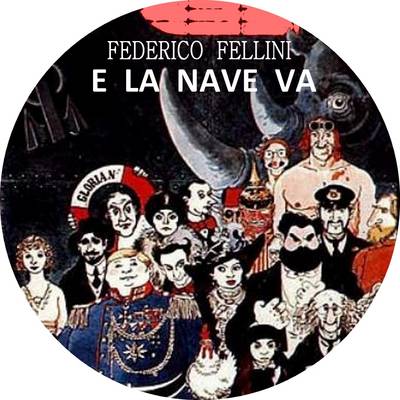
E LA NAVE VA (AND THE SHIP SAILS ON)
Italy, 1983, 132 minutes, Black and white/Colour.
Freddie Jones, Barbara Jefford, Victor Poletti, Peter Cellier, Norma West, Sarah- Jane Varley, Pina Bausch.
Directed by Federico Fellini.
1. The acclaim for this Fellini film? Yet the criticism of its style and content? Fellini as always blending the serious and the comic? The grotesques and their characteristics? His looking back and interpreting history? The combination in this film?
2. The studio work: the set for the ship, the wharf, the sea, the sky? The explosions? The ending? Audiences accepting the contrivances? The effect of accepting this? The musical score, the range of classics, Debussy, Verdi – and Destiny?
3. The range of people on the ship? 1914, the costumes, makeup? The pre-World War One world? The comedy of manners? The fops, the idle rich? Fellini and his presenting them – with the touch of satire and the grotesque?
4. The image of the Ship of Fools, the artificial sea, the motion, the lessening of motion, the becalmed ship?
5. The prologue and the cinema, the techniques of the silent film, the sound engineering and the inaudible voices, becoming louder? Audiences accepting this introduction and its style? The effect of knowing the silent movie techniques and accepting them? The celebration of cinema techniques?
6. The gallery of people, the elite, at the ball, the masks? The patricians and the plebeians? The circus? The end of an era? The impact of World War One and its changing European society? Nobility and royalty? The contrast with the workers on the ship?
7. The use of the image of the journey? The opera star, her body, being taken for burial? The entourage? The opera star in films and in photos? Her presence? Giving the film an operatic tone?
8. Orlando, Freddie Jones’s style? His presence on the ship, eccentric, his manner, drinking, the guests, imposing? His looking to the camera? Obsequious and deferential?
9. The singers on the ship, the producers, the musicians? Life and its parade? The action on deck? The meals, the tour of the boiler room – literally looking down on the workers? The contest?
10. The character of the grand duke, his appearance and manner, politics before World War One, their collapse, the empires and collapse? The prime minister? Sister, blind, diplomacy? Sight and deals?
11. The entertainment, the clowns and the circus, the chicken hypnotised, the glass conductor?
12. Rhinoceros, song, the smell?
13. The entrance of politics with the Serbs, refugees, the intimation of World War One and the role of Serbia, the history of the Balkan Peninsula – and Fellini’s premonition about what was to happen in the 1990s? The plebeians, their history, uncouth, the dance, their future? The attitude of the passengers towards them?
14. Sir Reginald, Lady Violet, the role of the British on board? In terms of a critique of Victorian and Edwardian England?
15. The contrast with the young, the innocent love and the maiden?
16. The terrorists, the bombs, the sinking of the ship? The drama of the finale? World War One exploding on Europe?
17. Orlando, saved, the survivors and those who drowned?
18. The place of this film in Fellini’s work and his canon?